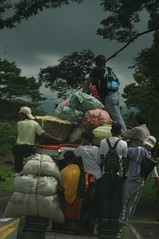Updates: ‘It is a national policy to keep the poor poor' – rural banker
(Photo courtesy of MindaNews) This Mindanawon rural banker looks more of a refined, meek and well-mannered person. Quitely placed in a corner seat, he was glued to the speaker through out the session.
He exchanged friendly chats with his seatmates and offered his seat to a lady participant who came late.
His statement caught me off-guard. It made me look closer. It was cold in that conference room in Davao’s Waterfront Insular Hotel on July 15.
Apparently, his way of announcing the judgment did not show in his mild manners. Here is a dissenter who freely expressed his mind and heart. I wanted to know the story behind that pronouncement.
I'll call him Freddie. He was one of the participants of the “consultative workshop” among micro finance institutions (MFIs) in Mindanao convened by the Mindanao Micro finance Council (MMC). They gathered to talk about a partnership between the MFIs, the wholesale lenders and the communities targeted to deliver micro finance services in “hard to reach” areas in Mindanao.
At first he sounded pathetic and plainly cynical. (Maybe one of those disillusioned by hopelessness) Or was he just testing my capacity to snoop for news knowing I was there to cover the event?
Over coffee break, Freddie told me his 15 years of working in rural communities as a small banker has made him critical of new programs of the government to lure the poor.
“Talk about the face of poverty in the depressed communities, I know that!” he said.
I handled hundreds of accounts who couldn’t pay their weekly amortization for their micro enterprise loan,” he said.
Freddie said the poorest of the poor in Mindanao, especially in agriculture-rich areas, shouldn't be poor. Productivity is high in those areas, he said. “But why are people still poor after how many years of projects?” he asked.
He said a farmer borrows money to buy farm inputs at a price much higher than how much the market wants to buy his products.
“So he always ends up speaking English,” he said. He clarified that when they collect payment for debts incurred with their bank, farmers who loaned money on a service they piloted in an area told them, “Failure man sir!”.
For him, micro financing makes lousy businessmen out of farmers. Yes, farmers have to be entrepreneurial in attending to their farms but they cannot do so because there is a lack of support services in their areas.
“Now you have a loan, but where are the farm to market roads and the mechanisms that protect them from losses?” Freddie asked.
For him, there is a big reason why the government could not solve the woes of the poor once and for all.
It is a national policy to keep the poor always poor, Freddie said, because our politicians who run the government want the poor to eternally need them!
He said studies, projects and programs to “supposedly help” the poor are just spins of those pretentious government leaders to manipulate a higher budget so they could get a higher cut.
“And the all-out war--- do you think that is really to solve insurgency?” Freddie asked. “No, that is to validate a bigger budget, well just the sum of P1 billion more,” he said.
Also, when there is war, the ammunitions are used, that’s for more budget. And look at the civilians affected by the war, when the government comes as if to their rescue, those politicians masquerading as public servants actually earn “popularity” points.
I asked him : “Do you have bases for these statements?”
He said the best proof are the poor in the communities who are prone to exploitation by politicians. Some people in government should be sincere in their effort to fight poverty and should be steadfast in their commitment to serve the public, he said.
“Really, there is so much poverty in the country. If you don’t believe me, you must be blind or dumb,” He said.
After a cup of coffee, I breathed fresh air in the hotel's lobby and pondered on those points. I know Freddie is right. I agree with him in most things. I shifted my vantage point and looked at the direction of the Davao Gulf for open spaces to think.
Maybe its unfair to call it a "national policy" because I don 't fault our good policies. Only the execution maybe. But I know what Freddie also meant. The government's failure to curb poverty has made poverty a "status quo" and eradicating it has become an illusion of mythical extent.
I wonder what “ask not what your country can do for you, but what you can do for your country” would mean in this situation?



0 Comments:
Post a Comment
Subscribe to Post Comments [Atom]
<< Home